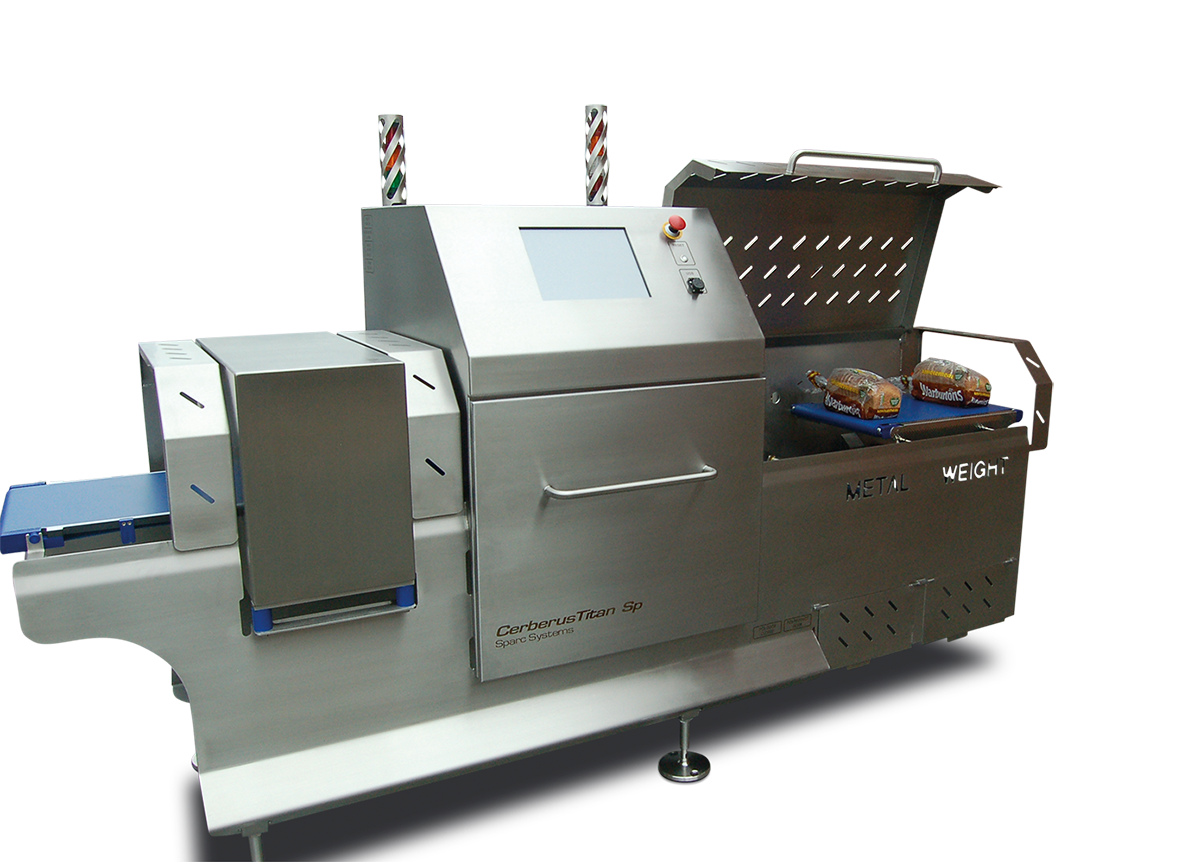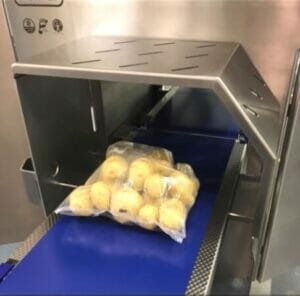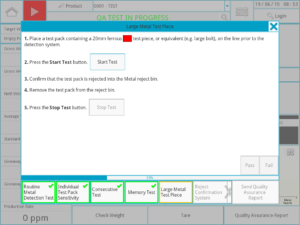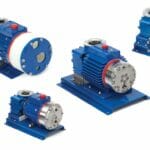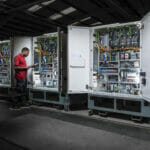Automation of inspection processes is on the rise, particularly in High Care food production environments where COP compliance and food safety assurance are integral to productivity. Driving down production costs while ensuring an accurate and reliable inspection process results in time and cost savings. With the Cerberus combination machine from Sparc Systems, automated metal detection and checkweighing, with the option to integrate label verification, are delivered in one space-saving unit.
The inspection machines market is projected to rise at a CAGR of 5.5% between now and 2024, with combination systems estimated to grow the most during the forecast period.[1] A number of factors are attributed to the increasing adoption of integrated technologies, from demand for inline product inspection to growing need to comply with GMP requirements. However, the efficiency of integrated inspection lines is yet to be realised by many UK food manufacturers who continue to monitor performance manually or by a machine-by-machine basis.
To address the unique challenges posed by the food manufacturing sector, Sparc is one of the few global inspection suppliers that offers cohesive reporting, data capture and COP testing in a combination system. Rather than slotting two systems together, the Cerberus provides complete mechanical and electronic integration with single point controls and trend feedback.
Specifically designed for High Care food production environments, the Cerberus ensures fast and accurate rejection of up to 200 out-of-tolerance or contaminated packs per minute. An integrated metal detector identifies ferrous and non-ferrous particles down to 1.5mm, and stainless steel down to 2.0mm in bags weighing up to 60kg. Sparc’s European Sales Manager Charlie Graham explains: “Designed, engineered and constructed to the highest High Care, Food Grade engineering standards, no other system in the world comes close to this performance and sensitivity.”
DRIVING DOWN PRODUCTION COSTS
Despite projected market growth, UK food suppliers are facing increasing pressure from all directions. With volatile market fluctuations and input costs squeezing already fragile margins, increasing output and installing reliable machinery are essential to drive down manufacturing costs and ensure productivity. The impact of machinery downtime alone costs Britain’s manufacturers more than £180bn every year.[2]
For checkweighing systems, reliability and accuracy is paramount to minimise downtime, false readings and food waste. Sparc addressed these issues by designing the Cerberus with a heavy, stainless steel frame. Whereas other suppliers are reducing weight, Sparc engineers maintain that a heavier framework reduces vibrations from the factory environment to eliminate the potential for false readings. Charlie comments: “In addition to its smart design, the high-spec checkweighing station offsets the potential for both costly product giveaway and incomplete packages reaching the market. In some cases, our customers have reported a 55% reduction in product giveaway.”
Keeping quality control front of mind, the system utilises a precision metal detector to inspect packaged food products. Identifying metal contaminants with high sensitivity drives increased security and reduces the risk of costly recalls. Food items involving numerous production steps where the potential for metal contaminants to enter the supply chain is higher (sliced meat and cheese, frozen products and convenience meals etc.) benefit from this repeatable and consistent inspection process.
- Rather than slotting two systems together, the Cerberus provides complete mechanical and electronic integration
- Sparc’s paperless audit software with unlimited pre-programmed COP and step-by-step process is a unique QA feature.
UNIQUE CONVEYOR CONCEPT
As a single unit, the Cerberus has two reject bins to separate contaminant and weight rejects situated beneath a three-position dipper conveyor. Notably, unlike most other combination systems which typically use pusher or air blast reject systems, the Cerberus uses an all-electric direct drive which dips 90 degrees and 45 degrees to segregates metal contaminated products from weight rejects.
BRC-approved reject bins are located beneath the conveyor framework rather than to the side, keeping the machine footprint as compact and slimline as possible. By containing these components within the body of the machine, plant flexibility and factory footprint are enhanced.
“As a high-end combination metal detector and checkweigher, the Cerberus was designed to eliminate emergency product recalls with minimal operator intervention at inspection set up or product changeover. Furthermore, the in-line, electric-powered reject system removes the need for compressed air, which has been proven to save some manufacturers up to £4,000 a year on running costs.
COP COMPLIANCE WITH PAPERLESS AUDITS
Regulatory mandates in the food industry to maintain compliance with retailer Codes of Practices and HACCP principles mean that the fully automated machines segment is expected to dominate the inspection equipment market in the years to come.[3] Every retailer COP requires food manufacturers to test their metal detectors and checkweighers regularly and document the results. But for staff completing the tests by hand, the costs in time and money can be vast and the process is subject to human error.
To ensure absolute traceability and compliance, Sparc designed the Cerberus with a single swipe touchscreen HMI and paperless audit software with unlimited pre-programmed COP. Believed to be the most transparent system of its type, contract packers and manufacturers supplying multiple retailers can select from an unlimited list of retailer COP by product type. When a routine Quality Assurance machine test is due – typically hourly – , a visual alert is issued to operatives. Steps cannot be skipped. And if not performed to the set retailer parameters, this is also flagged by the machine and in the data reported that’s transmitted to the factory’s Quality Assurance manager.
When upgrades are issued, Sparc simply sends the new retailer COP parameters, which operatives can insert and upload to the machine via the built-in USB.
Food factories are also able to select and bring to the HMI foreground their preferred operational parameters.
Charlie adds: “By generating constant feedback on operational statistics such as volume, weight and speed, downtime is reduced. And, the data capture element is fully integrated, making it simple to send information direct to the server or wireless devices.
“With the Cerberus, nothing gets passed these food safety gates. No other combi system can accurately inspect 200 food packs a minute without compromising on any other aspect of performance. It is literally the most transparent and integrated combi system on the market today.”
[1] https://www.marketsandmarkets.com/Market-Reports/inspection-machines-market-81453085.html
[2] https://www.themanufacturer.com/articles/machine-downtime-costs-uk-manufacturers-180bn-year/
[3] https://www.marketsandmarkets.com/Market-Reports/inspection-machines-market-81453085.html

